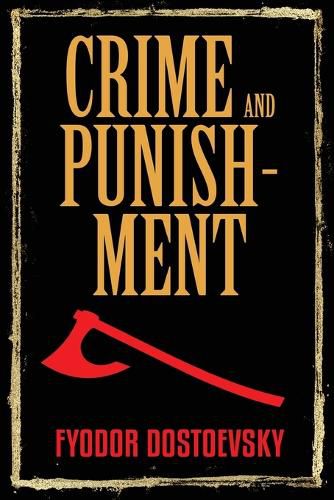Readings Newsletter
Become a Readings Member to make your shopping experience even easier.
Sign in or sign up for free!
You’re not far away from qualifying for FREE standard shipping within Australia
You’ve qualified for FREE standard shipping within Australia
The cart is loading…






Crime and Punishment is a novel by the Russian author Fyodor Dostoevsky. It is considered the first great novel of his mature period of writing and is often cited as one of the greatest works of world literature. Crime and Punishment follows the mental anguish and moral dilemmas of Rodion Raskolnikov, an impoverished ex-student in Saint Petersburg who plans to kill an unscrupulous pawnbroker, an old woman who stores money and valuable objects in her flat. He theorises that with the money he could liberate himself from poverty and go on to perform great deeds, and seeks to convince himself that certain crimes are justifiable if they are committed in order to remove obstacles to the higher goals of 'extraordinary' men. Once the deed is done, however, he finds himself wracked with confusion, paranoia, and disgust. His theoretical justifications lose all their power as he struggles with guilt and horror and is confronted with both internal and external consequences of his deed. Drawing upon experiences from his own prison days, Dostoyevsky recounts in feverish, compelling tones a psychological thriller infused with forceful religious, social, and philosophical elements.
$9.00 standard shipping within Australia
FREE standard shipping within Australia for orders over $100.00
Express & International shipping calculated at checkout
Stock availability can be subject to change without notice. We recommend calling the shop or contacting our online team to check availability of low stock items. Please see our Shopping Online page for more details.
Crime and Punishment is a novel by the Russian author Fyodor Dostoevsky. It is considered the first great novel of his mature period of writing and is often cited as one of the greatest works of world literature. Crime and Punishment follows the mental anguish and moral dilemmas of Rodion Raskolnikov, an impoverished ex-student in Saint Petersburg who plans to kill an unscrupulous pawnbroker, an old woman who stores money and valuable objects in her flat. He theorises that with the money he could liberate himself from poverty and go on to perform great deeds, and seeks to convince himself that certain crimes are justifiable if they are committed in order to remove obstacles to the higher goals of 'extraordinary' men. Once the deed is done, however, he finds himself wracked with confusion, paranoia, and disgust. His theoretical justifications lose all their power as he struggles with guilt and horror and is confronted with both internal and external consequences of his deed. Drawing upon experiences from his own prison days, Dostoyevsky recounts in feverish, compelling tones a psychological thriller infused with forceful religious, social, and philosophical elements.